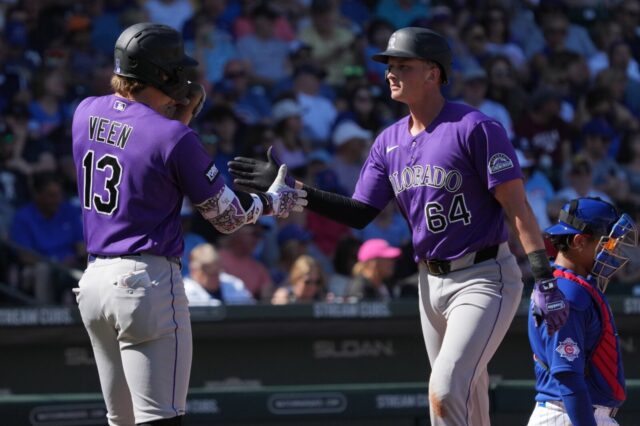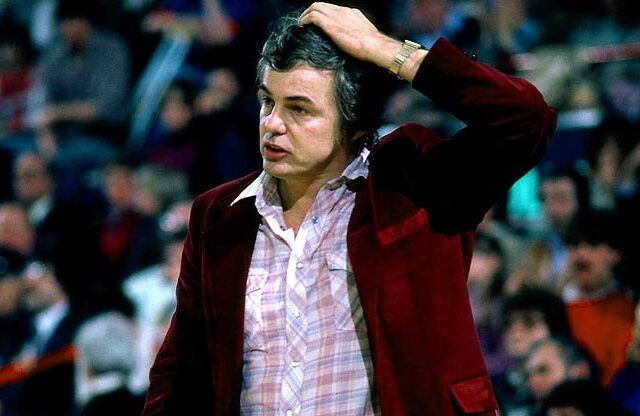Welcome back to fictional fantasy Colorado Rockies Land!
If you are new here, know that we previously bought the baseball club in Denver and instilled an entirely new staff.
After that, we gave the team a fresh look and feel with a rebrand aimed at putting old times behind us and fully embracing a new era.
Next came lobbying for MLB realignment to ease the travel schedule and create a fairer playing field of competition across the board.
So now it’s time to talk about on-field baseball strategy, yes? Well… not quite.
While realignment would, could, and should go a long way toward improving parity across the sport, the financial realities still loom large over anyone not playing (or rooting) in New York, LA, or Chicago. Yep. It’s time to talk about everyone’s favorite subject in school… economics!
It’s also time to make everyone angry by stating an inconvenient truth. Dick Monfort is right about the salary cap.
Despite what the teams and reporters in the big markets on the coasts will tell you, MLB is in the midst of a crisis where more than half the teams in the sport feel like “also rans” who at best can hope for tiny windows of contention.
Defenders of the status quo, where powerhouses like the Yankees and Dodgers can spend more on a player or two than other teams spend on their entire rosters, will point to aberrations and exceptions to get you to disbelieve your own lying eyes.
They’ll mention the Rangers and Diamondbacks World Series while conveniently leaving out how much Texas had to spend to get there. They’ll direct your attention to the Tampa Bay Rays, the darlings of Moneyball, and omit that they used to include the A’s right there along with them until it was no longer in vogue to invoke that franchise as one to emulate.
If we are digging into history, they will mention all kinds of fun Cinderella stories that admittedly do happen frequently in the sport. The 2019 Washington Nationals. The 2015 Kansas City Royals. The 2005 Chicago White Sox. Once again, those pointing to these counterexamples tend not to talk much about what happened to each of these teams in the aftermath of their parades.
During my lifetime, the biggest symbol of this dynamic has been the Miami Marlins who took home the big trophy in 1997 and 2003. But even with those championships, the Marlins as a franchise only have six fewer losses than the Rockies, both having entered the league in 1993.
So yes, teams outside of the rich and powerful institutions of baseball can win it all… but at what cost? On the flip side, the Dodgers and Yankees have famously gone through some fairly extended droughts in recent times. Not of missing the postseason, of course, but despite how dreary the future looks and what happened last season, they haven’t won ‘em all. Yet.
Due to the chaotic nature of the game of baseball, the best team on paper rarely ends up as champ, though it’s usually one of the top three or four. Sometimes a hot team with the best pitching in that exact moment can propel themselves to ultimate victory. This nearly happened for the Rockies in 2007, leading to their only pennant in team history. If you’ve ever been inclined to call that run “lucky” then you fully understand the position that most teams in baseball find themselves in. They have to get, to a degree, lucky.
The difference between MLB and the NFL or NBA is not about who has a chance to win any individual season but where and how it is possible to build consistent winners.
I won’t waste too much time arguing in favor of both a salary cap and floor because while I wholeheartedly believe both would make the sport much better, I also know both are heavily opposed by the owners and players. And that’s kinda everybody. Instead, I will point to those other sports as general models to follow and perhaps even improve upon ideas like franchise tags, TV/merch/ticket revenue sharing, and an end to this deferment business.
A better sharing of television, merchandising, and ticket revenue would be the biggest boon for the smaller and mid-market teams of MLB because no matter how smart and savvy your owner or GM, there will always be a disadvantage against teams that can market themselves globally.
In the NFL, Kansas City built a dynasty. In the NBA, Denver, Milwaukee, and Oklahoma City are powerhouses. Of course, LA, Boston, and New York (kinda) still achieve their successes as well but at least the other teams have a chance to rise up and challenge for more than just a season or two before disappearing back into being farm systems for the same hundred-year-old ballclubs that have always been at the top.



